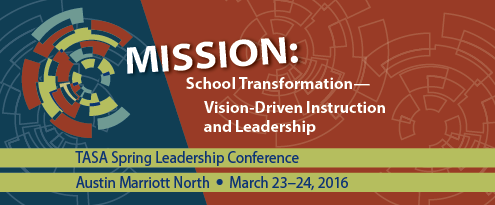The 2016 TASA Spring Leadership Conference, MISSION: School Transformation – Vision-Driven Instruction and Leadership, was held March 23-24 in Round Rock. Designed for TASA School Transformation Network subscribers but open to all Texas school leaders — at both the district and campus levels — committed to school transformation, the conference was an opportunity for attendees to engage in meaningful discussion and collaboration to help propel their school districts from vision to action.
General session speakers included Doug Christensen, professor of Leadership in Education at Doane College. Christensen was the Nebraska commissioner of education for 14 years after serving as a teacher, principal, superintendent, and university instructor. In recent years, he has consulted with TASA and members of the Texas High Performance Schools Consortium and School Transformation Network on the design of a next-generation assessment and accountability system, strengthened by his extensive research and work at the state and national levels. Watch his presentation.
AASA Associate Executive Director of Policy & Advocacy Noelle Ellerson updated attendees on the Every Student Succeeds Act (ESSA), which reduces federal intrusion in state and local education policy, eliminates NCLB’s one-size-fits-all method of using standardized assessments as the sole measure of student academic performance, and removes the punitive federal AYP mandate and the requirement that states utilize standardized test results in teacher evaluation. In her session, Ellerson, one of the leading advocates for ESSA on Capitol Hill, provided details on the law, the U.S. Department of Education’s implementation plans, and what they mean for Texas. She addressed aspects of ESSA that will support and enable school transformation. Watch her presentation.
John Tanner, founder and executive director of Test Sense, also addressed attendees. He said that the visioning effort for Texas schools demands a pivot when it comes to assessment and accountability: Both must move to overall student learning as their basis as opposed to the limited proxy of standardized test scores in a few core subjects. However, he admitted this is far easier said than done, and that many efforts that state similar goals succumb to the inertia of the past and wind up looking surprisingly similar to a predecessor they had hoped to leave behind. He said that change that sticks requires a disciplined approach that identifies at a deep level what must be changed, what the change is to, and the steps by which the change will be accomplished. Watch his presentation.
Conference attendees dedicated a significant amount of time immersed in a new tool, The Framework for Vision-Driven Instruction and Leadership, which outlines the roles that educators and school leaders should take to both support and advance MISSION: School Transformation. It serves as a starting point for districts in determining future-ready instructional and leadership practices in schools and classrooms. Attendees broke into working groups that examined and discussed various topics from the visioning document and how they can impact campuses and districts using the new framework.
Updates were also provided on new initiatives and resources related to key Mission: School Transformation goals:
- High-priority learning standards – the revision of the English/Spanish Language Arts TEKS being conducted by the State Board of Education
- Multiple assessments – the work of the Commission on Next-Generation Assessments and Accountability and the Texas High Performance Schools Consortium’s involvement, plus the pilot writing assessment program created by HB 1164 that will give participating school districts flexibility from state law
- Digital learning – recent enhancements to the TASA on iTunes U® digital resource library, related professional development offerings, and a new resource created by TASA on iTunes U content leads that provides practical advice and examples for Texas educators implementing digital learning and other transformation principles
- Community-based accountability – another new resource, A Process and Framework for Community-Based Accountability, thatcan help Texas school districts jump-start implementation of community-based accountability systems

